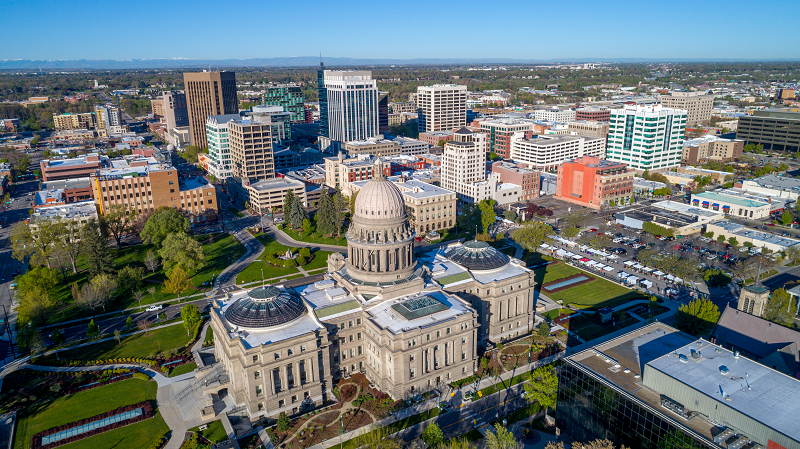
Property taxes are probably a concern if you’re looking to buy or sell a home in Idaho. Property taxes in Idaho are soaring as the value of homes continues to rise. That leads many to wonder about Idaho property tax exemptions.
Luckily, there are exemption programs for property taxes in Idaho. If you qualify, these programs can significantly reduce the property tax burden. But, you have to know they exist before you can apply.
As a home buyer or seller, you’ll also want to know other Idaho state taxes. For example, Idaho’s capital gains tax can greatly impact your finances when selling a home.
Below, we’ll discuss Idaho property taxes and exemptions. We’ll also talk about other Idaho taxes and what they mean. That way, you can budget for taxes and apply for exemptions accordingly.
An Overview of Idaho Property Taxes
In Idaho, property taxes apply to homes, farmland, commercial, and industrial properties. So, if you own land or a house in Idaho, you’ll owe property taxes yearly.
None of the funds from property taxes go to the state as a whole. Instead, property taxes go to individual counties to provide local services, like schools, parks, and law enforcement.
That means property tax amounts vary by area of the state, and what you pay in Boise taxes will differ from other cities and counties.
How Property Taxes in Idaho Work
If you own property in Idaho, a county assessor will estimate the market value of your property each year.
The assessor will look at your property’s size, condition, and location. Then, they will compare it to similar properties that have sold in the last year, giving them the home’s assessed value, which the county assessor’s office will use to determine how much property tax you owe.
The property tax you owe also depends on the tax rate for your district.
Each property is located within multiple taxing districts. These districts may include school districts, county districts, sewage districts, and others.
Each district sets a yearly budget for the services they plan to provide. Then, they divide that budget by the taxable values of all the properties in their district, which gives a taxable rate.
Your home or property’s assessed value multiplied by its district’s tax rates will give you the annual property tax you owe.
Therefore, homeowners’ property taxes vary greatly by county, school district, and city.
Usually, you’ll find higher tax rates in more urban areas with more resident services and lower tax rates in rural areas with fewer needs.
For example, the effective property tax rate in Boise, Idaho, is .60%. On the other hand, rural Custer County’s rate is far lower at only .31%. And, in populous Ada County, the rate is much higher at .73%.
Idaho Tax Laws
Of course, property tax isn’t the only tax to be aware of in Idaho. Idaho levies several other taxes on residents that home sellers and buyers in the state should pay attention to.
Income Tax
In Idaho, taxpayers pay a personal income tax as a percentage of income. The percentage is based on your income bracket and varies from 1.6% to 7.4%. Compared to other states, this is reasonable.
Consumer Tax
Consumer taxes in Idaho include sales tax, cigarette tax, gas tax, gambling tax, use tax, and liquor tax. All the consumer taxes are relatively low compared to other states, making Idaho reasonably affordable.
Capital Gains Tax
Perhaps most important to anyone trying to sell a house fast in Idaho, though, is the capital gains tax. Capital gains tax in ID applies to any property or asset, such as your home, that you own for at least one calendar year and sell for more than the cost.
Capital gains are taxed as income, but a capital gains deduction may apply. The deduction is for up to 60% of the capital gain.
Idaho Property Tax Exemptions

Idaho property taxes are relatively low compared to the rest of the country. That said, rising property values across the state are leading to substantial rises in property taxes for Idaho homeowners.
Luckily, exemptions like the homeowner’s exemption, Idaho’s circuit breaker program, and others are helping to keep taxes manageable. All of these exemptions come from Idaho Code, Title 63, Chapter 6, which you can find on the tax.Idaho.gov website.
Homeowner’s Exemption
In Idaho, if you own a home as your primary residence, that home and up to one acre of land could qualify for the homeowner’s exemption. It allows property owners to exempt 50% of the value of their home and up to one acre of land, up to $125,000.
You only have to apply once for the homeowner’s exemption to the county commissioner’s office. Once approved, you’ll receive the exemption until the home is no longer your primary dwelling or you’re no longer the homeowner.
Property Tax Reduction Program (Circuit Breaker)
The property tax reduction program, also known as Idaho’s circuit breaker program, can reduce the amount of property tax you owe. This program benefits widows, motherless or fatherless children, senior citizens, former POWs, and those with registered disabilities.
To apply for this program, you must submit an application between January 1st and April 15th to the county assessor’s office each year. If you meet eligibility requirements, you’ll see a reduction of between $250 and $1500 on your property taxes.
Property Tax Deferral Program
Idaho’s property tax deferral program allows you to defer a portion of the property taxes you owe. Particular residents such as senior citizens, those with disabilities, or those with low incomes may qualify. The application deadline is April 15th, and you must apply every year.
This program is a deferral, though, not a true exemption. You will still owe property taxes with interest at a later date.
Hardship Exemption
Idaho residents may also receive a property tax exemption due to a period of hardship. This exemption is entirely up to the county commissioners, who may, at any time, cancel property taxes for a resident who has experienced undue hardship.
A hardship exemption is rare, but you can submit an exemption application to the county commissioner’s office if you feel you may qualify.
Casualty/Loss Exemption
If your personal and real property is damaged to the point of a casualty loss, Idaho’s board of equalization can issue a property tax exemption. They offer these exemptions on a case-by-case basis. If you think you might qualify, you must apply to the Board of Equalization office by end-of-day of the fourth Monday of June.
How to Find Out If You’re Exempt from Property Taxes
If you’re exempt from Property Taxes in Idaho through any of the exemptions listed above, you won’t receive separate notice in the mail. Instead, after you apply, you’ll need to check your property’s assessment notice. There, it will state whether your application for an exemption has been approved.
You can also call your local assessor’s office. Alternatively, you may want to speak to a local financial advisor. A financial advisor experienced in Idaho tax law will be able to walk you through the many property tax exemptions as well as the application process.
Final Thoughts
There are several Idaho property tax exemptions you may qualify for. The most common is the homeowner’s exemption, which can exempt you from up to 50% of your home’s value and 50% of the land’s value that it sits on (up to one acre).
Other exemptions may also assist you with property taxes in Idaho. You should be aware of other taxes if you plan to buy or sell in the Gem State.
The ID housing market is changing fast and can be tricky to navigate. If you’re trying to buy or sell a house fast in Idaho, you’ll want the cash home buyers Boise or the surrounding areas have to offer. Luckily, we buy homes Nampa homeowners are trying to sell. Contact us today for a speedy home purchase.
